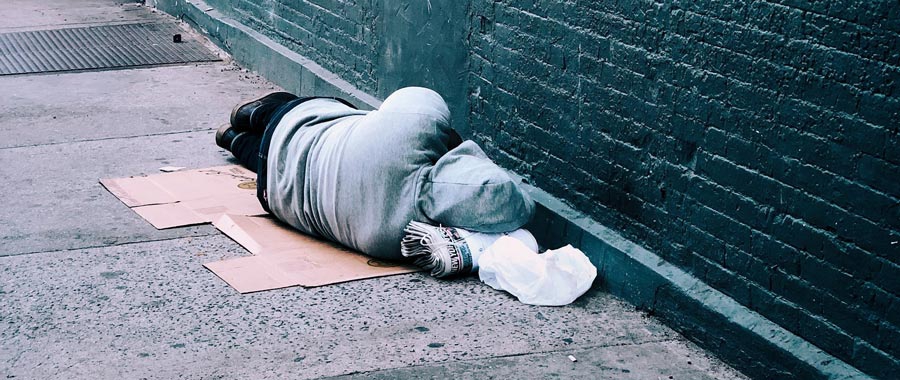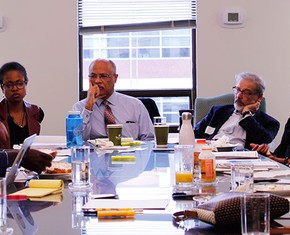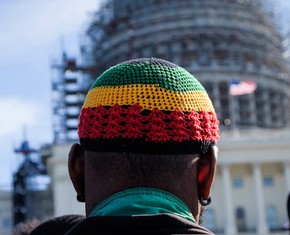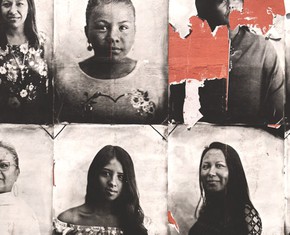The views expressed in our content reflect individual perspectives and do not represent the authoritative views of the Baha'i Faith.
In the mid-1980s I worked in downtown Los Angeles, near where many homeless people lived on Skid Row. Every day I saw their poverty and misery, and eventually I resolved to see what I could do about it.
When I encountered homeless people on the streets, when I talked with them or bought them a meal, I wanted so badly to somehow alleviate their hopelessness and abject poverty. They had nothing, and I had a place to live. That seemed so unjust, so fundamentally wrong.
Why? Well, I acutely felt the pain of their plight because I was poor and homeless for a time myself as a teenager, when I left my family’s house and had nowhere to live. Luckily, some high school friends took me in (thanks, Bob and Glenn!) and I at least had a temporary roof over my head and food to eat until I could save enough money to pay rent.
I became a Baha’i during that period, too.
Baha’u’llah, the prophet and founder of the Baha’i Faith, was homeless himself for a significant part of his life. Imprisoned and tortured by a repressive Persian regime, those authorities also confiscated Baha’u’llah’s properties, including the home he and his family lived in, which had become known as a sanctuary for the poor and destitute. Suddenly homeless, exiled from place to place, all his belongings taken from him, he even lived for periods of time in caves in the mountains of Iraq and in a dank cell in a dismal prison in Akka, Palestine.
Like so many of the founders of the great Faiths, Baha’u’llah suffered throughout much of his life from extreme poverty, uncertainty, persecution and deprivation. He knew firsthand about the life of a poor person without a home. That may help explain why the Baha’i teachings offer a comprehensive panoply of principles regarding homelessness and poverty – and why they emphasize our collective human responsibility to construct a more moral and spiritual society where those preventable ills have no place:
Be generous in prosperity, and thankful in adversity. Be worthy of the trust of thy neighbor, and look upon him with a bright and friendly face. Be a treasure to the poor, an admonisher to the rich, an answerer of the cry of the needy, a preserver of the sanctity of thy pledge. – Baha’u’llah, Gleanings from the Writings of Baha’u’llah
What could be better before God than thinking of the poor? For the poor are beloved by our heavenly Father. When Christ came upon the earth, those who believed in Him and followed Him were the poor and lowly, showing that the poor were near to God. When a rich man believes and follows the Manifestation of God, it is a proof that his wealth is not an obstacle and does not prevent him from attaining the pathway of salvation. After he has been tested and tried, it will be seen whether his possessions are a hindrance in his religious life. But the poor are especially beloved of God. Their lives are full of difficulties, their trials continual, their hopes are in God alone. Therefore, you must assist the poor as much as possible, even by sacrifice of yourself. No deed of man is greater before God than helping the poor. – Abdu’l-Baha, The Promulgation of Universal Peace
Inspired by Baha’u’llah’s message and Abdu’l-Baha’s example, I decided to try, in my own small way, to be a treasure to the poor, an admonisher to the rich, and an answerer of the cry of the needy.
So a few friends and I formed a new non-profit Skid Row service organization called Homeless Healthcare Los Angeles (www.hhcla.org). We saw a rapidly increasing need for humanitarian action, because more and more people were becoming homeless. At the time, the new American president had recently signed the Omnibus Budget Reconciliation Act of 1981, repealing the previous president’s Mental Health Systems Act and ending the Federal government’s role in providing hospitalization services to the mentally ill. When America’s network of mental hospitals closed, mentally ill people had nowhere to go but the streets. America’s drug epidemic and the untreated PTSD of the millions of former soldiers who had returned from the Vietnam War added to the country’s rapidly-growing homelessness epidemic.
Our small group had little money and few resources, so we started very humbly, with only one staffer and a tiny office. We sought out grants, contributions, and donations from the wealthy individuals, families and foundations we knew. Los Angeles, we learned, has a huge and even obscene disparity between enormous wealth and abject poverty. Moving from one extreme to the other often gave us profound culture shock – we’d hold a fundraiser in a lavish Beverly Hills mansion and then meet our clients in a cardboard box on a downtown sidewalk on the same day.
“What’s wrong with this society?” we constantly asked ourselves when we faced this stark disparity. As I read and studied the Baha’i writings, I came across this passage from Abdu’l-Baha, and it helped me answer that question:
Although the body politic is one family, yet, because of lack of harmonious relations some members are comfortable and some in direst misery; some members are satisfied and some are hungry; some members are clothed in most costly garments and some families are in need of food and shelter. Why? Because this family lacks the necessary reciprocity and symmetry. This household is not well arranged. This household is not living under a perfect law. All the laws which are legislated do not ensure happiness. They do not provide comfort. Therefore, a law must be given to this family by means of which all the members of this family will enjoy equal well-being and happiness.
Is it possible for one member of a family to be subjected to the utmost misery and to abject poverty and for the rest of the family to be comfortable? It is impossible unless those members of the family be senseless, atrophied, inhospitable, unkind. Then they would say, “Though these members do belong to our family, let them alone. Let us look after ourselves. Let them die. So long as I am comfortable, I am honored, I am happy – this, my brother – let him die. If he be in misery, let him remain in misery, so long as I am comfortable. If he is hungry, let him remain so; I am satisfied. If he is without clothes, so long as I am clothed, let him remain as he is. If he is shelterless, homeless, so long as I have a home, let him remain in the wilderness.”
Such utter indifference in the human family is due to lack of control, to lack of a working law, to lack of kindness in its midst. If kindness had been shown to the members of this family, surely all the members thereof would have enjoyed comfort and happiness. – Ibid.
From the beginning we decided to do what we could to help the most vulnerable and under-served homeless people – the ones no other agency would serve – people with co-occurring disorders of substance abuse and mental illness, IV drug users, HIV-positive teenagers and adults, recently released prisoners. Our organization grew, and its efforts ultimately succeeded in changing the lives of thousands of homeless people – and they changed my life, too. The homeless people I met, some of the kindest and most gentle souls imaginable, became my brothers and sisters in the human family.
So it turned out that I served on the board of directors of Homeless Health Care Los Angeles for a quarter-century, and today I do the same at a homelessness agency called Hospitality House in Northern California. This path of service to poor people, inspired by the Baha’i teachings, led me into a path of service to poor folks I couldn’t have previously imagined – to help make documentary films about homelessness, contribute to books on the issue, advocate for new laws and even get a few of them enacted, write editorials and do many, many media interviews and speaking engagements about the problem of homelessness and its potential solutions. Meanwhile, the crisis of homelessness in America grew exponentially, far outstripping our efforts to end it or even deal with it adequately.
It kind of snuck up on me, but it turns out that I wound up devoting a large portion of my life to this arduous work. Along the way, I learned some things about what it will take to solve the homelessness crisis that plagues our cities and towns, not just in the United States but in so many other countries, as well. In this extended series of essays, I’ll draw on my experience and on the wise counsel contained in the Baha’i teachings to recommend a set of societal steps we could collectively take to tackle the pressing problem of homelessness and actually solve it.
In the first five segments of this series, we’ll explore the Baha’i principles on poverty and homelessness; and in the second set of five additional essays we’ll look at some practical, achievable steps we could take as a society to alleviate the problem and get everyone into a home.
First, we can all benefit from contemplating this Baha’i advice:
May you be well-wishers of all humanity. May you be assistants of every poor one. May you be nurses for the sick. May you be sources of comfort to the broken in heart. May you be a refuge for the wanderer. May you be a source of courage to the affrighted one. Thus, through the favor and assistance of God may the standard of the happiness of humanity be held aloft in the center of the world and the ensign of universal agreement be unfurled. – Ibid.
















Comments
Sign in or create an account
Continue with Googleor